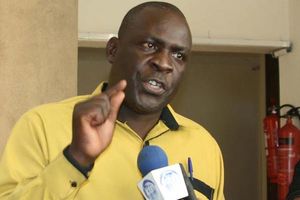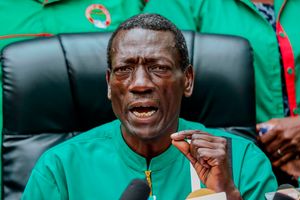
Kenya National Union of Teachers officials, led by deputy secretary general Hesbon Otieno (centre), address the media in Litein, Kericho County on June 7, 2025.
Teachers’ unions have warned of disruptions to learning in public schools following a deadlock over negotiations for a new collective bargaining agreement (CBA) with the government that would see teachers’ salaries raised.
The warning has come with only three weeks left to expiry of the 2021–2025 CBA the unions signed with the Teachers Service Commission (TSC).
To compound the problem, there is no provision for improved salaries for teachers in the 2025-2026 budget. The current CBA will expire on June 30 2025.
The Kenya National Union of Teachers (Knut), the Kenya Union of Post Primary Education Teachers (Kuppet), and the Kenya Union of Special Needs Education Teachers (Kusnet) have all issued firm demands to the TSC, urging the employer to begin negotiations immediately or face industrial action.
“We submitted our proposals months ago, but instead of engaging, the TSC continues to hide behind the ‘waiting for advice from the Salaries and Remuneration Commission (SRC)’ as an excuse’,” said Knut deputy secretary Hesbon Otieno.
Senior officials of the TSC appeared before the Education Committee of the National Assembly on May 13 to present the 2025–2026 budget estimates, only to reveal that no funds have been allocated for another CBA.
“Key areas that are not funded at all in the 2025–2026 budget for the TSC include the financial requirement for the CBA that is under negotiation,” said Cheptumo Ayabei, TSC’s director of finance.
Knut is demanding a 60 per cent adjustment in basic salaries over the four-year period, pegged on inflation, alongside a 30 per cent increase in allowances. The union also wants promotions to be based on merit, experience, and qualifications, and a review of Career Progression Guidelines (CPG) to ensure the entry level for new teachers begins at Job Group C1 and not B5 as currently structured.
The union is also pushing for revised medical exit policies, and an improvement in sick leave terms from the current three months full pay and three months half pay to six months full pay and six months half pay.
Kusnet secretary-general James Torome, said the union has not received any update from the TSC since July 2024, when the commission acknowledged receiving their proposals.
“We are yet to commence negotiations on the 2025 – 2029 CBA with the TSC. The last letter only promised to ‘revert in due time’ thus we are still waiting,” Mr Torome told Nation.
Kusnet is demanding differentiated salary increments: 40 percent for principals and school heads (grades D1–D5) and 50 percent for lower cadres (B5–C5).
Expansion of hardship areas
The union also wants a risk allowance of Sh15,000 monthly and a uniform allowance of Sh15,000 annually for Special Needs Education (SNE) teachers, citing their quasi-nursing roles that require protective gear.
Additionally, the union has called for a 50 percent increase in all other allowances, and an expansion of hardship areas, warning that any adjustments to the hardship policy must go through the courts as previously agreed by unions.
Kuppet secretary-general Akelo Misori expressed his concern over the lack of engagement, despite the TSC having no leadership vacuum.
“The commission is fully constituted and what we now need is for the acting CEO, Evaleen Jesang Mitei to initiate talks and ensure the process is seamlessly followed,” Mr Misori said.
Kuppet has tabled a broad range of demands, including a review of job descriptions for classroom teachers – a move it says is necessary to correct the skewed salary structure that favours school administrators.
“During the previous review, the SRC held that only school administrators are leaders. This resulted in a positive salary review for administrators which opened a gap between them and classroom teachers with similar qualifications and experience,” he explained.
Kuppet is demanding a salary increment of between 30 and 70 percent, and 100 percent increase in selected allowances.
In its memorandum of demands to the TSC, the union wants the CBA cycle reduced from four to two years to allow for more responsive adjustments.
Further, Kuppet is demanding for a review of the career progression guidelines to pave way for automatic promotions up to the level of deputy principal. The proposal is that from Grade D1, the TSC should open two promotional tracks, one for administrators and another for non-administrators.
Other demands include full compensation for acting positions and eventual elimination of acting roles, harmonisation of house allowances with Cluster 1 regions such as Nairobi, payment of Per Diems for out of station work and introduction of post-graduate and risk allowances.
The 2021–2025 CBA, largely non-monetary, was signed amid financial strain caused by the COVID-19 pandemic. However, with the economy now more stable, union officials say there is no justification for further delay or inaction.
CBAs are essential as they offer structured and timely dialogue to protect and promote the rights, welfare, and working conditions of teachers.







